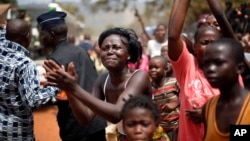GENEVA —
United Nations aid agencies are expressing alarm at the health condition of thousands of refugees arriving in Cameroon from the Central African Republic, describing some as close to death.
U.N. aid agencies say growing numbers of refugees are arriving acutely malnourished and ill, often in a desperate state of health after covertly traversing the bush for weeks before reaching the border.
The agencies report the death rate among the refugee children has been very high, with dehydration, hypothermia and severe anemia listed as the primary causes of death.
World Food Program spokeswoman Elizabeth Byrs says about 80 percent of women and children are in need of therapeutic feeding to survive.
“We are concerned because it is also the start of the rainy season and we anticipate a deterioration of the living condition in the camps, with the risk of diseases," Byrs said.
Byrs says WFP already has distributed food to over 42,000 refugees in camps and border areas, adding that the growing refugee population is scattered in many locations, putting a big strain on the agency’s resources.
The mainly Muslim C.A.R. refugees have been fleeing violence and revenge attacks by the largely Christian anti-Balaka militants since mid-December.
UNHCR spokesman Adrian Edwards tells VOA he does not know whether the refugees are being actively pursued by the anti-Balaka, but that the refugees are clearly fleeing in panic.
“The journey that people are making from C.A.R. is a journey of intimidation, of starvation, of death," Edwards said. "Many of the people arriving in Cameroon and other countries, in addition to being severely malnourished ... are severely wounded.”
Edwards says the UNHCR is moving refugees away from the border to six locations where they can be protected from possible conflict. The decision to relocate the people follows reports of regional infiltration of anti-Balaka fighters.
The U.N. refugee agency says more than 2,000 refugees cross into Cameroon every week, far less than the recent peak of more than 10,000 who entered in the last week of March.
Edwards attributes to decrease to activity by the anti-Balaka militia, who he says have blocked main roads leading to Cameroon.
Newly arriving refugees are telling aid workers many of family members still trapped in the bush, unable to escape the violence and mayhem.
U.N. aid agencies say growing numbers of refugees are arriving acutely malnourished and ill, often in a desperate state of health after covertly traversing the bush for weeks before reaching the border.
The agencies report the death rate among the refugee children has been very high, with dehydration, hypothermia and severe anemia listed as the primary causes of death.
World Food Program spokeswoman Elizabeth Byrs says about 80 percent of women and children are in need of therapeutic feeding to survive.
“We are concerned because it is also the start of the rainy season and we anticipate a deterioration of the living condition in the camps, with the risk of diseases," Byrs said.
Byrs says WFP already has distributed food to over 42,000 refugees in camps and border areas, adding that the growing refugee population is scattered in many locations, putting a big strain on the agency’s resources.
The mainly Muslim C.A.R. refugees have been fleeing violence and revenge attacks by the largely Christian anti-Balaka militants since mid-December.
UNHCR spokesman Adrian Edwards tells VOA he does not know whether the refugees are being actively pursued by the anti-Balaka, but that the refugees are clearly fleeing in panic.
“The journey that people are making from C.A.R. is a journey of intimidation, of starvation, of death," Edwards said. "Many of the people arriving in Cameroon and other countries, in addition to being severely malnourished ... are severely wounded.”
Edwards says the UNHCR is moving refugees away from the border to six locations where they can be protected from possible conflict. The decision to relocate the people follows reports of regional infiltration of anti-Balaka fighters.
The U.N. refugee agency says more than 2,000 refugees cross into Cameroon every week, far less than the recent peak of more than 10,000 who entered in the last week of March.
Edwards attributes to decrease to activity by the anti-Balaka militia, who he says have blocked main roads leading to Cameroon.
Newly arriving refugees are telling aid workers many of family members still trapped in the bush, unable to escape the violence and mayhem.









